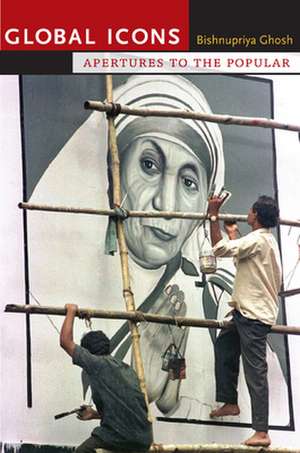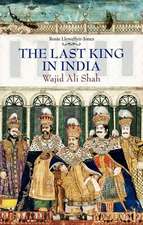Global Icons – Apertures to the Popular
Autor Bishnupriya Ghoshen Limba Engleză Paperback – 23 aug 2011
Preț: 352.43 lei
Nou
Puncte Express: 529
Preț estimativ în valută:
67.44€ • 70.55$ • 56.02£
67.44€ • 70.55$ • 56.02£
Carte tipărită la comandă
Livrare economică 02-16 aprilie
Preluare comenzi: 021 569.72.76
Specificații
ISBN-13: 9780822350163
ISBN-10: 0822350165
Pagini: 400
Ilustrații: 38 illustrations (incl. 3 frontispieces)
Dimensiuni: 155 x 232 x 26 mm
Greutate: 0.75 kg
Ediția:New.
Editura: MD – Duke University Press
ISBN-10: 0822350165
Pagini: 400
Ilustrații: 38 illustrations (incl. 3 frontispieces)
Dimensiuni: 155 x 232 x 26 mm
Greutate: 0.75 kg
Ediția:New.
Editura: MD – Duke University Press
Cuprins
Illustrations; AcknowledgmentsIntroduction: Icon MattersPart 1. Incorporations: Theorizing the Icon 1. Moving Technologies; 2. Corporeal AperturesPart 2. Biographs: The Material Culture of Global Icons3. Media Frictions; 4. Public Image Ltd.; 5. Those Lives Less Ordinary; 6. Volatile Icons Part 3. Locations: The Politics of the Icon7. In the Name of the Popular; 8. Becoming SocialNotes; References; Index
Recenzii
"This analysis of global icons and the enigmatic ways in which they work through the global fabric and the local public imagination revolves around three very contrasting images from different fields of signification. They are of three women: Phoolan Devi, Arundhati Roy, and Mother Teresa....Ghosh, taking Coca Cola as an instance, looks at how the global intersects the local in unpredictable ways: on the one hand, it lures the local into the global paradise of consumption and, on the other, its own proliferation as global icon offers the protest movements the cultural means to form or deform such attachments to the global, subversive ends." C. S. Venkiteswaran, The Hindu, February 27th 2012
This is an ambitious account of the plastic potentializaton of images in the age of iconoclashes. Into the impersonal world of global mass communications, Bishnupriya Ghosh restores the richness of gender, god, nature, and chaos, making our epistemological encounters with mundane objects ingredients of a sumptuous materialist media theory of the bio-icon. Rey Chow, author of Sentimental Fabulations, Contemporary Chinese Films
Global Icons is a thoughtful intervention into vital issues not usually examined together: the political potential of contemporary mass-mediated bio-icons and embodied engagements with media images at the current conjuncture of neoliberalism and globalization. Bishnupriya Ghosh compellingly revitalizes materialist analyses of media, of iconic efficacy, and of neoliberal image regimes and, while shes at it, performs a refreshing deprovincialization of the global.--Kajri Jain, author of Gods in the Bazaar: The Economies of Indian Calendar Art
"This analysis of global icons and the enigmatic ways in which they work through the global fabric and the local public imagination revolves around three very contrasting images from different fields of signification. They are of three women: Phoolan Devi, Arundhati Roy, and Mother Teresa...Ghosh, taking Coca Cola as an instance, looks at how the global intersects the local in unpredictable ways: on the one hand, it lures the local into the global paradise of consumption and, on the other, its own proliferation as global icon offers the protest movements the cultural means to form or deform such attachments to the global, subversive ends." C. S. Venkiteswaran, The Hindu, February 27th 2012 "This is an ambitious account of the plastic potentializaton of images in the age of iconoclashes. Into the impersonal world of global mass communications, Bishnupriya Ghosh restores the richness of gender, god, nature, and chaos, making our epistemological encounters with mundane objects ingredients of a sumptuous materialist media theory of the bio-icon." Rey Chow, author of Sentimental Fabulations, Contemporary Chinese Films "Global Icons is a thoughtful intervention into vital issues not usually examined together: the political potential of contemporary mass-mediated 'bio-icons' and embodied engagements with media images at the current conjuncture of neoliberalism and globalization. Bishnupriya Ghosh compellingly revitalizes materialist analyses of media, of iconic efficacy, and of neoliberal image regimes and, while she's at it, performs a refreshing deprovincialization of the 'global'."--Kajri Jain, author of Gods in the Bazaar: The Economies of Indian Calendar Art
This is an ambitious account of the plastic potentializaton of images in the age of iconoclashes. Into the impersonal world of global mass communications, Bishnupriya Ghosh restores the richness of gender, god, nature, and chaos, making our epistemological encounters with mundane objects ingredients of a sumptuous materialist media theory of the bio-icon. Rey Chow, author of Sentimental Fabulations, Contemporary Chinese Films
Global Icons is a thoughtful intervention into vital issues not usually examined together: the political potential of contemporary mass-mediated bio-icons and embodied engagements with media images at the current conjuncture of neoliberalism and globalization. Bishnupriya Ghosh compellingly revitalizes materialist analyses of media, of iconic efficacy, and of neoliberal image regimes and, while shes at it, performs a refreshing deprovincialization of the global.--Kajri Jain, author of Gods in the Bazaar: The Economies of Indian Calendar Art
"This analysis of global icons and the enigmatic ways in which they work through the global fabric and the local public imagination revolves around three very contrasting images from different fields of signification. They are of three women: Phoolan Devi, Arundhati Roy, and Mother Teresa...Ghosh, taking Coca Cola as an instance, looks at how the global intersects the local in unpredictable ways: on the one hand, it lures the local into the global paradise of consumption and, on the other, its own proliferation as global icon offers the protest movements the cultural means to form or deform such attachments to the global, subversive ends." C. S. Venkiteswaran, The Hindu, February 27th 2012 "This is an ambitious account of the plastic potentializaton of images in the age of iconoclashes. Into the impersonal world of global mass communications, Bishnupriya Ghosh restores the richness of gender, god, nature, and chaos, making our epistemological encounters with mundane objects ingredients of a sumptuous materialist media theory of the bio-icon." Rey Chow, author of Sentimental Fabulations, Contemporary Chinese Films "Global Icons is a thoughtful intervention into vital issues not usually examined together: the political potential of contemporary mass-mediated 'bio-icons' and embodied engagements with media images at the current conjuncture of neoliberalism and globalization. Bishnupriya Ghosh compellingly revitalizes materialist analyses of media, of iconic efficacy, and of neoliberal image regimes and, while she's at it, performs a refreshing deprovincialization of the 'global'."--Kajri Jain, author of Gods in the Bazaar: The Economies of Indian Calendar Art
Notă biografică
Descriere
Develops a materialist theory of global iconicity, taking into account the emotional and sensory responses that iconic figures elicit and the multiple modernities within which they are interpreted













